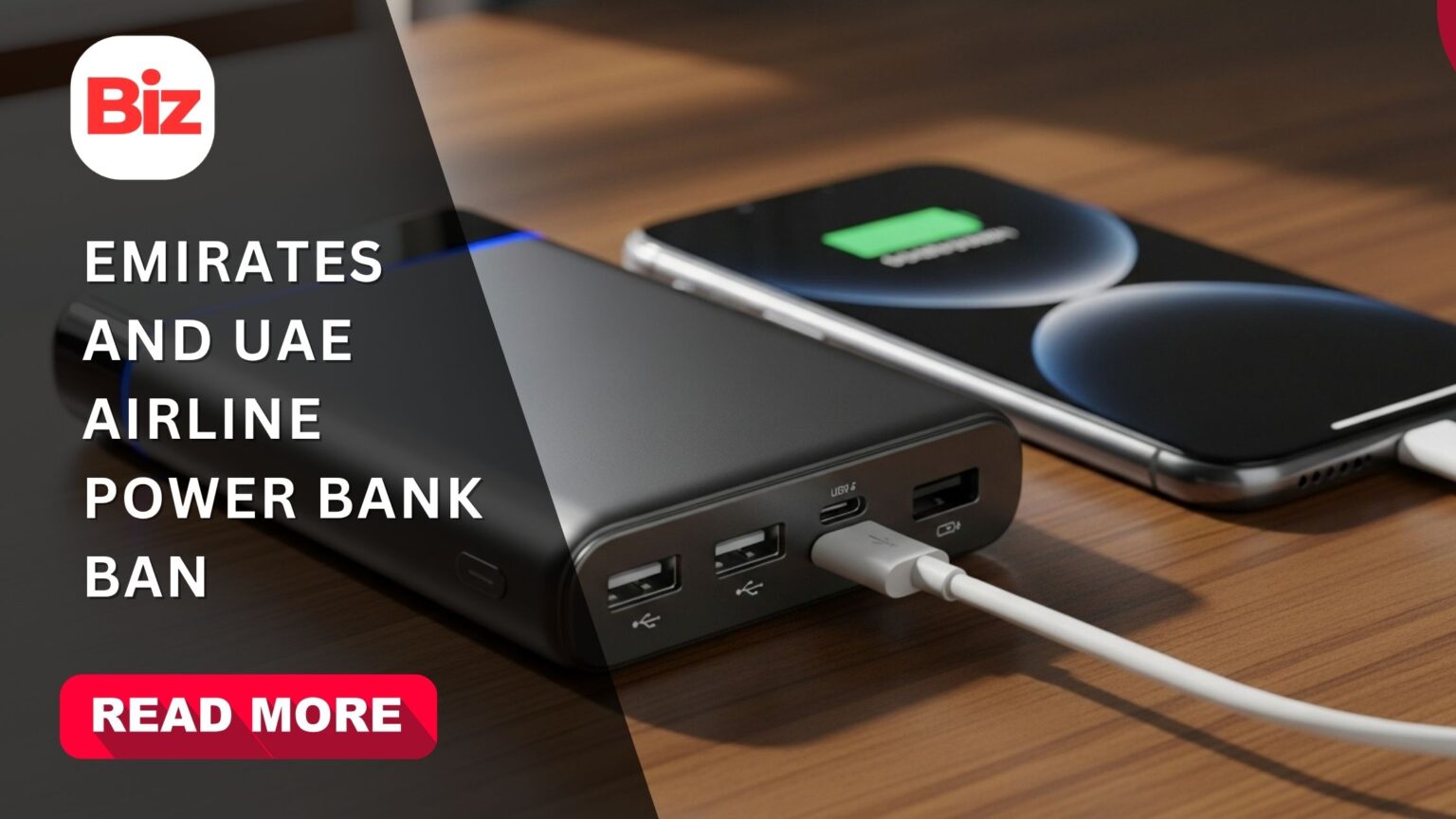- The reason why airlines are banning power banks
- Emirates Airlines Flights: New Power Bank Restrictions
- Flydubai Joins Emirates: Revised rules by October 2025.
- Air busan has issued a world first ban on power banks
- The Global Aviation Industry’s Position
- Why Now? Rising Incidents and Safety Reviews
- What passengers need to know
- Balancing Passenger Needs and Safety
- Looking Ahead: Will Other Airlines Follow?
- Conclusion
The debate around lithium-ion batteries has reached new heights as airlines tighten their policies on power banks. Following Emirates headline-making announcement in August 2025, another UAE carrier, flydubai, has now introduced its own restrictions. Both airlines give safety reasons as the rationale behind such moves. The news highlights the fact that the aviation industry is increasingly wary of lithium-ion batteries in the form of portable power banks that are technically classified as dangerous goods.
Interestingly enough, this tendency is not a one-sided one in the UAE only. In early 2025, Air Busan banned power banks worldwide, which made the world focus on the risks associated with portable batteries. All these developments combined shed light on a global change in the practice of airline safety, an aspect that will have a direct effect on the passengers all over the world.
The reason why airlines are banning power banks
Power banks are convenient indeed. In the modern hyper-connected world, it is rare that passengers board long-haul flights without some type of backup charging. However, there is something insidious in their utility: lithium-ion batteries can become hot, break out, or even blow up in case of damage or defective production.
These dangers have been cautioned by the International Air Transport Association (IATA). Lithium Battery Shipping Guidelines (LBSG) published in 2014, specified power banks and lithium batteries as dangerous goods that should be handled carefully. The danger revolves around a process called thermal runaway – a chain reaction within a battery cell that may cause smoke, fire, and release of toxic gases.
With the rising number of reported in-flight incidents involving batteries, airlines are under pressure to act.
Emirates Airlines Flights: New Power Bank Restrictions
On August 8, 2025, Emirates announced sweeping new rules regarding the carriage of power banks. Effective October 1, 2025, the airline has banned the use of all power banks onboard its flights.
Here’s what Emirates passengers need to know:
- Carriage permitted with limits: Customers may carry one power bank under 100 Watt Hours (Wh).
- Usage prohibited: Power banks may not be used to charge devices in-flight. Charging a power bank using the aircraft’s power supply is also banned.
- Storage rules: Power banks cannot be placed in overhead bins. Instead, they must be stored in the seat pocket or under the seat in front of the passenger.
- Checked baggage ban: Consistent with existing aviation regulations, power banks are not allowed in checked luggage.
Despite these restrictions, Emirates assures passengers that in-seat charging ports remain available across its fleet. Still, the airline strongly advises travelers to fully charge their devices before departure — particularly on long-haul routes where device usage is high.
This policy, Emirates says, reflects its commitment to in-flight safety while maintaining a premium passenger experience.
Flydubai Joins Emirates: Revised rules by October 2025.
Only a few weeks after Emirates made its announcement, flydubai published its own updated instructions, which take effect on October 1, 2025. One power bank, which must not exceed 100 Wh, is allowed on the plane, but the rating must be indicated. The devices that have a higher capacity are strictly forbidden.
Flydubai, similar to Emirates, stresses the fact that lithium-ion batteries are a high-risk factor. The airline uses the watt-hour rating and carry-on regulations to reduce the risks and remind passengers that they should feel comfortable.
Air busan has issued a world first ban on power banks
Before Emirates flights and flydubai made headlines, Air Busan had already made aviation history earlier in 2025. The South Korean low-cost carrier became the first airline in the world to issue a full ban on power banks.
Unlike Emirates, which permits limited carriage but bans in-flight use, Air Busan prohibits passengers from bringing any power banks aboard its flights. The decision was widely reported as a world-first ban on power banks and marked a pivotal moment in global aviation safety practices.
While controversial at the time, Air Busan’s move now appears prescient. Other airlines are following with similarly strict — if slightly less absolute — measures.
The Global Aviation Industry’s Position
The aviation industry’s treatment of power banks is shaped by the IATA Dangerous Goods Regulations (DGR). These regulations provide baseline rules:
- Carry-on only: Spare lithium-ion batteries and power banks must be carried in hand baggage.
- Capacity limits: Under 100 Wh is generally acceptable. Between 100 and 160 Wh requires airline approval. Anything above 160 Wh is prohibited on passenger aircraft.
- Operator variations: Airlines and regulators may impose stricter conditions than IATA’s minimum. Emirates’ outright ban on in-flight use is one such example.
In 2025, IATA released updates in its 66th edition of the DGR, including new packaging rules and state-of-charge requirements, reflecting heightened industry caution.
Why Now? Rising Incidents and Safety Reviews
The timing of these airline bans is no coincidence. According to Aviation Week, the number of lithium battery-related incidents has grown steadily in recent years. These include overheating, smoke, and even fires traced back to power banks.
Thermal runaway, the key hazard, is particularly concerning in a sealed aircraft cabin where smoke or fire can quickly escalate into a serious safety event. Emirates confirmed that its new rules followed a comprehensive safety review that flagged these rising risks.
A timeline of recent incidents shows multiple cases where power banks either ignited mid-flight or caused smoke that forced emergency action. With aviation safety being uncompromising, airlines have little choice but to adopt tougher stances.
What passengers need to know
The new power bank rules that will be implemented by Emirates are:
- One power bank of less than 100Wh can be carried by the passengers.
- Onboard charging cannot be done with power banks.
- You cannot recharge power banks with the power supply of the aircraft.
- Every power bank should have information on the capacity rating.
- Power banks should not be stored in overhead bins; they need to be stored in the seat pocket or under the seat.
- Power banks are still not allowed as checked baggage.
While inconvenient, these steps are designed to keep passengers safe — a priority that outweighs the temporary loss of convenience.
Balancing Passenger Needs and Safety
Airlines are now walking a fine line between ensuring safety and meeting passenger expectations. Emirates, for instance, has invested heavily in onboard charging infrastructure, giving passengers alternatives to personal power banks. Flydubai, too, offers USB charging on newer aircraft.
Nevertheless, travelers accustomed to carrying multiple high-capacity power banks will need to adjust. The airline industry’s shift signals that convenience can no longer come at the expense of safety.
Looking Ahead: Will Other Airlines Follow?
Given that Air Busan issued a world-first ban on power banks and Emirates has now banned inflight usage across its global fleet, industry experts predict other airlines may soon follow.
Carriers in Asia, the Middle East, and Europe are already reviewing their policies in light of recent incidents. If the trend continues, the airline power bank ban could become standard practice worldwide.
For now, passengers should always check their airline’s specific rules before flying. With policies evolving quickly, staying informed is the only way to avoid last-minute hassles at the airport.
Conclusion
The airline power bank ban is no longer a hypothetical scenario. As Emirates flights and flydubai introduce new limitations as well as the precedent of Air Busan, the industry is obviously moving towards greater control of portable batteries.
Lithium-ion batteries could become the workhorse of our present-day life, yet in a small aircraft, airlines cannot risk the dangers associated with this trend. Airlines are opting to be safe first, either due to partial restrictions or complete bans.
To passengers, the message is simple: book in advance, pay in advance, and obey the law. The age of unlimited reliance on power banks while flying is coming to an end








